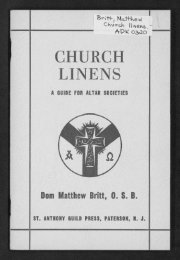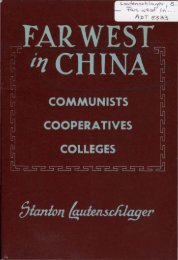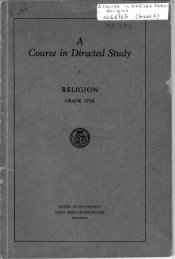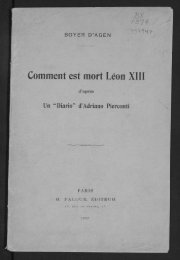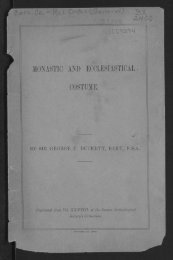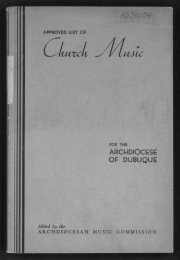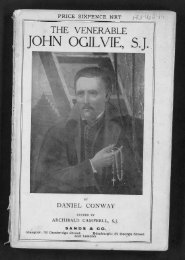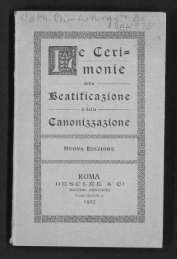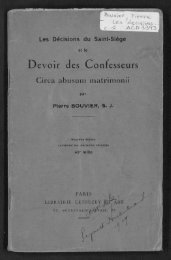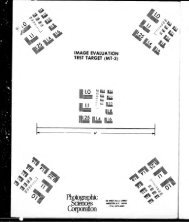r The Catholic Democracy of America,64 - Digital Repository Services
r The Catholic Democracy of America,64 - Digital Repository Services
r The Catholic Democracy of America,64 - Digital Repository Services
You also want an ePaper? Increase the reach of your titles
YUMPU automatically turns print PDFs into web optimized ePapers that Google loves.
<strong>The</strong> <strong>Catholic</strong> <strong>Democracy</strong> <strong>of</strong> <strong>America</strong>, 45<br />
one 1 which will reflect unfading glory on that State as long as<br />
liberty is cherished in the hearts <strong>of</strong> men." It runs:—<br />
" Whereas the enforcing <strong>of</strong> conscience in matters <strong>of</strong> religion hath<br />
frequently fallen out to be <strong>of</strong> dangerous consequence in those commonwealths<br />
where it has been practised, and for the more quiet and peaceable<br />
government <strong>of</strong> this province, and the better to preserve mutual love and<br />
unity amongst the inhabitants, no person whatsoever within this province<br />
pr<strong>of</strong>essing to believe in Jesus Christ shall be anyways troubled or molested<br />
for his religion, nor in the free exercise there<strong>of</strong>, nor anyway compelled to<br />
the belief or exercise <strong>of</strong> any other religion against his consent."<br />
If the grim and narrow religious tests <strong>of</strong> the New England<br />
governments be compared with the Maryland pr<strong>of</strong>ession <strong>of</strong><br />
Christianity it will not be a matter <strong>of</strong> wonder that the Protestant<br />
historian we have quoted, himself a New Englander,<br />
declared that here " Conscience was without restraint."<br />
<strong>The</strong> same eminent writer proceeds to describe how the disfranchised<br />
friends <strong>of</strong> prelacy from Massachusetts, and the<br />
Puritans from Virginia, were welcomed to equal liberty <strong>of</strong><br />
conscience and political rights in Roman <strong>Catholic</strong> Maryland,<br />
and he tells the shameful story how, five years later, when the<br />
Puritans gained the ascendancy in the colony, they had neither<br />
the gratitude to respect the rights <strong>of</strong> the government by which<br />
they had been hospitably received, nor the magnanimity to<br />
continue the toleration which alone had enabled them to<br />
reside in Maryland. It was now the turn <strong>of</strong> the Puritan<br />
majority to pass " an Act concerning religion," which forbade<br />
liberty <strong>of</strong> conscience to be extended to " Popery, prelacy or<br />
licentiousness <strong>of</strong> opinion."<br />
Nearly forty years later this contraband § prelacy " became<br />
predominant, and in 1692 the Assembly established the Anglican<br />
Church in Maryland, erecting parishes throughout the<br />
colony, and levying a tax on all citizens for the support <strong>of</strong> the<br />
clergy, and in 1704 was passed "an Act to prevent the increase<br />
<strong>of</strong> Popery in the province," which inter alia enabled a child<br />
born <strong>of</strong> <strong>Catholic</strong> parents, on becoming a Protestant, to exact<br />
from its father in his lifetime the share <strong>of</strong> his property which<br />
would otherwise devolve upon it after his death. Roman



